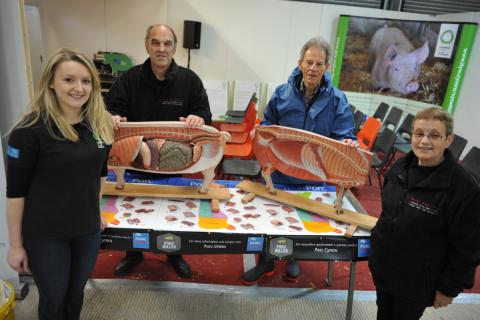Adopting best practice husbandry would avoid the need to use antibiotics, and where necessary, detecting early signs of illness would help Wales’ pig producers move away from a ‘just in case’ approach to antibiotic use, advises a vet with a special interest in pigs.
By observing signs at an early stage, prompt action can be taken, Bob Stevenson told producers attending a series of Farming Connect seminars at the 2017 Royal Welsh Spring Fair.
“Antibiotic use is coming under increasing scrutiny but by learning to spot the signs of disease, it is possible to intervene early with the most appropriate measures and treatments.
“For example, coughing and sneezing over and above what is considered normal are strong indicators of whether a pig is ill or its environment is poor.’’
Mr Stevenson urged producers to become good stockmen and women. “Own your pigs, glean information to assess if pigs are healthy and happy.’’
He advocated sampling for respiratory diseases with measures including obtaining a representative sample of blood or the recently developed sampling rope technique, which pigs can chew to provide saliva for analysis.
Disease screening can be cost effective and often much cheaper than producers anticipate, and allows for changes to be made before a problem occurs and any impact on productivity.
With antibiotic usage coming under greater scrutiny, evidence-based medicine is increasingly important.
“When a pig is ill you need to know the cause. It is no longer acceptable to just use antibiotics and hope that it works,’’ insisted Mr Stevenson.
He favoured an “as much as necessary and as little as possible’’ approach. “It is important not to prejudice the welfare of pigs by not giving them antibiotics when needed.
“In the farm’s pig health plan will be listed the correct prescribed antibiotics for the correct animal at the correct time at the correct dose and the right route of administration.’’
Not only do vets have an important role to play in prescribing medications based on good evidence but pig owners and their staff must be properly trained in health protocols.
“Train operatives through part-funded courses including those offered by Farming Connect,’’ Mr Stevenson recommended.
The gold standard of preserving pig health is to prevent diseases coming onto the unit.
Mr Stevenson recommended putting a virtual barrier in place – a point of separation with signage - to prevent vehicles and people without the right biosecurity clothing from encountering pigs.
“Insist that lorry drivers wear tough over-shoes if they are required to assist.
“Always provide disinfectant and make sure it is used properly and have a hoof pick for removing potential sources of disease from the cleats of boots.’’
Making a list of ‘risk’ vehicles is helpful and it is always worth making a request to be the first delivery of the day on a feed supplier’s round.
Pig performance is undermined by diseases so requesting a report from the abattoir will give producers a clearer picture of the health status of their herds.
He warned pig producers to avoid the mindset that their herds won’t succumb to disease. “The mindset that it won’t happen to me is wrong. When you lower your guard, that is when problems occur.’’
The Farming Connect workshops were facilitated by Jodie Roberts, Wales Pigs and Poultry Technical Officer at Farming Connect. She said disease control was a major factor in herd productivity therefore it was in producers’ best interests to make sure they had excellent biosecurity safeguards.
“Paying attention to the simple measures that have been outlined in the Farming Connect workshops will prevent diseases coming onto units,’’ she said.
For further information on training and all other Farming Connect services or events, contact your local development officer.

